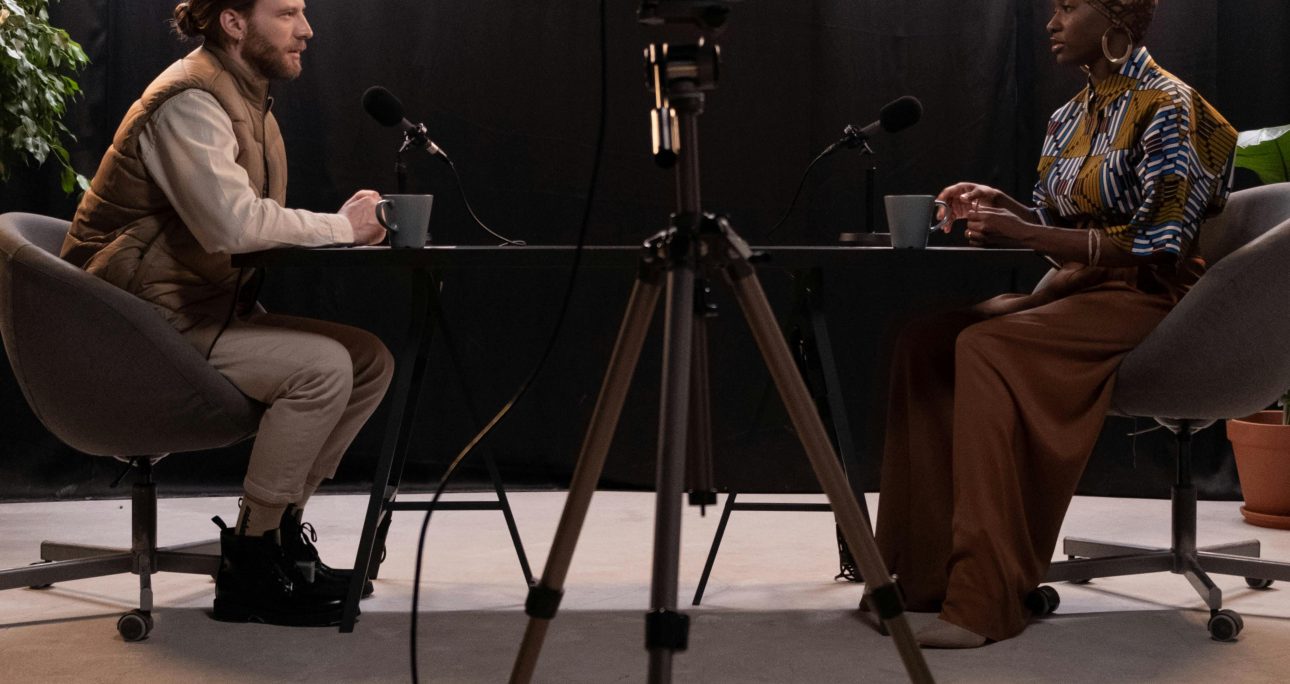Featuring shows on reality TV, true crime and a story of Second World War espionage.
Have you missed the biggest news of the week? Or the stories that will shape our lives in years to come, when the passing hype of the day’s headlines have faded from memory. That’s what we explore on The Week’s own award-winning podcast, «The Week Unwrapped», which seeks out under-reported stories with unexpected consequences. Listen on: Spotify, Apple Podcasts, Google Podcasts or wherever you find podcasts.
Split Screen: Kid Nation
Reality TV is «proving rich source material for podcasters in the market for wild stories and retrospective outrage», said Fiona Sturges in the FT. One of the most «disturbing» reality shows ever was Kid Nation, a series from 2007 in which 40 children were thrown together for a Lord of the Flies-type experiment in New Mexico. As is made clear in a fascinating new podcast, Split Screen: Kid Nation, many found the experience a «nightmare». Host Josh Gwynn paints a «grimly unsettling picture of naive parents, terrified children and ratings-hungry TV execs who are still trying to justify their decisions 17 years later».
The Bachelor of Buckingham Palace
A less obviously cruel reality TV show – but still crass and manipulative – was I Wanna Marry «Harry», a 2014 TV show that «lured a gaggle of American women to a grotty hotel on the outskirts of Reading» and convinced them that they were competing for the affections of Prince Harry (a lookalike called Matt). Scott Bryan’s excellent new podcast, The Bachelor of Buckingham Palace, takes the deception at the heart of the show seriously, while also having enormous fun with its «myriad WTF moments».
Long Shadow: In Guns We Trust
«How did we get here, and how do we get ourselves out?» That’s the question posed by Long Shadow: In Guns We Trust, a compelling new podcast about the «painfully intense» love affair between so many Americans and their guns, said Jenny McCartney in The Spectator. The host, Garrett Graff, is a gun owner himself, and «grew up in the hunting grounds of Vermont, where ‘the first day of deer season was almost like a state holiday'». But he’s uneasy about «the gradual sanctification of the right to bear arms», and worried about its consequences: the highest levels of gun ownership in US history and the highest recorded number of mass shootings. «Thus far this is a gripping podcast, providing a map for the evolution of a grim status quo.»
To Catch a Scorpion
Barzan Majeed, aka Scorpion, is the man behind a major cross-Channel people-smuggling operation, said Miranda Sawyer in The Observer. By all accounts he’s a «highly scary, money- obsessed scumbag», who has been happy to fleece desperate people for whatever he can get. And that is a lot. Charging £8,000 for a single place in an overcrowded dinghy, he has been able to net £500,000 from a single trip. The «riveting» new BBC podcast To Catch a Scorpion is about a quest to track Majeed down, and tells the stories of some of those who have been desperate enough to use his services, and those of smugglers like him. It is made by the award-winning documentary-maker Sue Mitchell, with Rob Lawrie, a former soldier with contacts everywhere from Calais to Iraq, and thanks to their efforts, Majeed was arrested in Kurdistan this week.
Serial
There’s «exciting news for audiophiles«, said Fiona Sturges in the FT. Serial, which kicked off the boom in true-crime podcasts ten years ago, is back for a fourth series. The show made its name with a «whodunnit» – the story of the murder of a Baltimore high-school student and the potentially unsafe conviction of her ex-boyfriend. Since then, Serial has broadened its range to examine other aspects of the US criminal justice system. The new series is about Guantánamo Bay, the US naval base in Cuba where hundreds of suspected terrorists have been detained. The subject has been covered by other podcasts, not least Radiolab’s The Other Latif. What Serial brings to it is many gripping new interviews with former employees – including interrogators, guards and chaplains, as well as several one-time detainees. Their accounts are sometimes «raw and shocking». Serial covers it all with «methodical reporting» and a «thoughtful observational tone». «It’s good to have it back.»
History’s Secret Heroes
A second ten-part edition of the stylish Second World War espionage series History’s Secret Heroes «parachuted» onto BBC Sounds last week, said Tristram Fane Saunders in The Telegraph. As before, the show – which follows a «one spy per episode» format – is scripted by historian Alex von Tunzelmann, and narrated with «characteristic intelligence» by Helena Bonham Carter. The opening episode is «a corker», featuring clips of a 1981 interview with Ida Cook, the author of more than 100 Mills & Boon novels, who (with her sister Louise) helped dozens of Jewish families to escape Nazi Germany in the 1930s. «I never had a husband,» she says. «I never had a car, I never had a television set, I never even had a washing machine, but it’s been a marvellous life.»
The Belgrano Diary
Andrew O’Hagan is «an amazingly busy man», said James Marriott in The Times. His state-of-the-nation novel Caledonian Road has just been published – and barely a week later, he has launched a terrific podcast that is «scarcely less ambitious». In the six-part The Belgrano Diary, O’Hagan explores whether the Thatcher government lied about the sinking of the Argentinian battle cruiser General Belgrano during the Falklands War in 1982. What might have been a dry affair – parsing evidence of the ship’s direction of travel, and definitions of «exclusion zone» – turns out to be «an enthrallingly novelistic tour of British society in the early 1980s». We hear from plummy grandees, «cantankerous publishers, Thatcher-hating activists, flag-waving British patriots and Argentinian servicemen», and even Michael Heseltine, who’s still «formidable» at 91. The central character is most compelling of all: Lieutenant Narendra Sethia, the supply officer in HMS Conqueror, the submarine that sank the cruiser.

Who Replaced Avril Lavigne?
The Irish comedian Joanne McNally is already a «star podcaster» thanks to her work on My Therapist Ghosted Me, said Patricia Nicol in The Sunday Times. For her «gossamer-light» new series – Who Replaced Avril Lavigne? – she immerses herself in the world of celebrity conspiracy theories to explore the notion that the singer Avril Lavigne died in the early 2000s, when her career was taking off, and was replaced by a lookalike. (Spoiler alert: it’s nonsense.) McNally «has fun trying to inhabit the persona of an investigative reporter (‘What would Stacey Dooley do?’) and aping true-crime tropes», and there are contributions from the comedians Gearóid Farrelly and Joe Lycett. It «is more about the craic than conspiracy-busting», but makes for an enjoyable listen.
Miss Me?
Celebrity-hosted podcasts are often a bit flat because «the stars involved don’t do the behind-the-scenes work on their presenting, and are too cautious about their careers to do anything other than gush», said Miranda Sawyer in The Observer. But Miss Me?, by lifelong friends Lily Allen and Miquita Oliver, is not one of these. Their show is relaxed, super-honest – and «laugh-out-loud funny». Oliver, a London-based TV presenter, takes on more of the hosting role, while pop star Allen, who lives in Brooklyn, supplies «intimate and hilarious» anecdotes. (Sample: once, when a rapper she was sleeping with asked her about her liposuction scars, she was so embarrassed, she told him they were the result of a hip replacement.) It’s really two shows in one: on Mondays the pair chat about what’s on their minds or in the news, then on Thursdays they answer listeners’ questions. «Topics arrive and are dismissed, talked around, then recalled; huge diversions are made into other areas.» It’s a bit messy and a «complete hoot».
Finally! A Show About Women That Isn’t Just a Thinly Veiled Aspirational Nightmare
When launching a new podcast, you need to come up with a memorable title that also trips off the tongue, said Fiona Sturges in the FT. It seems the creators of Finally! A Show About Women That Isn’t Just a Thinly Veiled Aspirational Nightmare «didn’t get the memo – or, more likely, they ignored it». But never mind, because the podcast itself has an «understated yet distinctive charm». Produced by Jane Marie, of This American Life, and Joanna Solotaroff, of 2 Dope Queens, it is comprised of half-hour episodes that follow a day in the life of various American women. We hear from sky-diving octogenarian Jean Ketcham from Minnesota; Valerie June, a «velvet-voiced» country-soul singer from Memphis; and Hillary Branyik, from Seattle, who gets «up with the lark» each day to work at a fish market, among others. «It’s a series of sweet, funny and fascinating self-portraits», and is warmly recommended.
A Muslim & A Jew Go There
It has become a podcasting cliché to have hosts from «opposite sides of the fence creating a safe space for civil discussion», said Fiona Sturges in the FT. The newest offering in this vein is A Muslim & A Jew Go There, featuring the comedian and author of Jews Don’t Count, David Baddiel, and Sayeeda Warsi, the Tory peer and author of The Enemy Within: A Tale of Muslim Britain. Rather than the last squeeze of a «close to exhausted formula», their podcast feels like «a necessary show of friendship and understanding» in febrile times. In the first episode, the pair discuss the language of racism, from the words «Islamophobia» and «antisemitism» to the slogan «From the river to the sea». What’s striking so far is «how much Warsi and Baddiel agree on; the test will be what happens when their opinions diverge».
Three Million
Kavita Puri’s Three Million is «the most thought-provoking history series I have heard in months, possibly years», said Patricia Nicol in The Sunday Times. In Britain, the Bengal famine is remembered – if at all – as a stain on the reputation of Winston Churchill. The wartime prime minister was slow to take the crisis seriously, and refused requests for food aid from the British colonial government. However, the focus of Puri’s series (on BBC Sounds and Radio 4) is not on the failed response to the famine, and the ways in which that worsened the crisis, but on the three million killed by it. «Eighty years on, there is no museum, memorial or monument to those mostly impoverished, nameless dead.» Thanks to vivid accounts from people who were children at the time, the period «emerges not as something distant and dusty but vital living history». This is an «intellectually rigorous, emotionally resonant and elegantly made series. I wholeheartedly recommend it.»
Law and Disorder
«I always enjoy hearing lawyers argue because the world is becoming ever more chaotically disputatious anyway – and at least they’re trained to do it properly,» said Jenny McCartney in The Spectator. Law and Disorder is a lively new podcast from three of Britain’s legal luminaries, Helena Kennedy, Charlie Falconer and Nicholas Mostyn (don’t confuse their podcast with a US series with the same name). The trio review the news (such as the war in Gaza, the Rwanda Bill and the latest from the Post Office scandal) through a legal lens, engaging in «feisty debate» rather than seeking «ponderous consensus». Listeners will certainly leave «better informed than when they started. They may also be more worried about Britain’s direction of travel.»
Close Readings: On Satire
I have been «completely beguiled» by Close Readings: On Satire, from the London Review of Books, said James Marriott in The Times. The podcast, which kicks off with an exploration of Erasmus’s In Praise of Folly, is hosted by Colin Burrow and Clare Bucknell. Both are fellows of All Souls who»generally speak English rather than academic gobbledegook», and they have «a lovely chemistry. The younger Bucknell is teasingly withering. Burrow is self-deprecating and silly. Both are unpompous and winningly alive to the absurdity of academic life» – and together they’ve made a «fascinating» series.
June: Voice of a Silent Twin
The strange and harrowing case of the «silent twins» has long fascinated the public, said Patricia Nicol in The Sunday Times. Born to Barbadian parents who moved to west Wales in the 1970s, identical twins June and Jennifer Gibbons had speech impediments which led them, ultimately, to refuse to talk to anyone except each other. They retreated into a private world, writing novels together and dreaming of becoming authors. In their teens, however, they went on a crime spree; they were convicted of petty theft and arson (for setting an empty building on fire), and, aged 19, they were committed to Broadmoor. There they remained for 11 years. Their story – and that of the «staggering miscarriage of justice» they suffered – has been told many times before. What sets apart the new BBC Sounds podcast «June: Voice of a Silent Twin» is that it features the surviving twin, June, «falteringly» telling her own «desperately sad story» for the first time. «The result is a compassionate, deftly made and gripping» nine-part series. Even if you think you already know all about the Gibbons twins, «give this a listen«.

Untold: The Retreat
«Many of us have the vague idea that meditation is, if not the lifechanging path that its biggest fans claim, then at least nothing worse than benign woo-woo,» said James Marriott in The Times. But «Untold: The Retreat», a superb new Financial Times podcast, presents evidence that it can actually be very dangerous, if taken to obsessive excess. The series, made by the «wonderfully named Madison Marriage, whose haunting RP tones are well fitted to these unhappy tales of upper-middle-class seekers gone awry», includes harrowing accounts of hallucinations, psychosis – and worse. «I was gripped.»
Self Help
«Podcasts aimed at self-improvement, whether through meditation techniques, diets or new exercise regimes, are ten-a-penny and, for this grouchy listener, frequently irritating,» said Fiona Sturges in the Financial Times. So it was good to discover that Self Help, a new five-parter from the audio artist, writer and presenter Scottee, is (despite its title) emphatically «not one of those». Self Help is a «delightful» series in which Scottee discusses his long experience of mental illness. The podcast is billed as «a collection of thoughts, feelings, intuitions and ideas from a life spent clinically mad», and experienced through the lens of Scottee’s «class, queerness and neurodiversity». The listener joins him on long walks around rural Scotland, sometimes in thunder and rain, as he delivers compelling monologues with «thoughtfulness, candour and lots of laughter». It’s a «warmly intimate» and «absorbing» experience.
Child
India Rakusen is the journalist behind two well-received podcast series: 28ish Days Later (about the menstrual cycle) and Witch (about witches). Now she’s back, said Anna Leszkiewicz in The New Statesman, with a third «interesting, meandering» series – titled Child. She talks to cell biologist Magdalena Zernicka-Goetz about the earliest days of life, when a jumble of cells known as the embryoblast divides into the «epiblast» («good word!») and the «hypoblast». And she talks to the child psychotherapist Graham Music, who likens a foetus to a cosmonaut that takes over the spaceship of the mother’s body. «It isn’t like the mother is building the foetus – they’re building each other.» Rakusen is «guided by sheer curiosity, and has a magpie-like instinct for interesting details». The series (on Radio 4 and as a podcast on BBC Sounds) is a «delightful mosaic of trivia. Lean in close to each fact, thought and observation. Then step back, and see the picture that emerges.»
Things Fell Apart
The first season of Jon Ronson’s podcast Things Fell Apart – exploring the history of various culture wars – was «superb», said James Marriott in The Times. Yet I was sceptical about the prospect of a second. Is there really anything more to add? The answer, of course, is yes. In these episodes, Ronson focuses less on the background and more on «real people’s stories» – those of the victims and perpetrators of the culture wars as well as «bystanders» caught in the crossfire. We hear from an ordinary family who went on a camping holiday only to be mistaken for dangerous left-wing activists; from a student disciplined for causing «emotional harm» after asking another student to leave a party. Ronson is «sympathetic, wise and funny» – but combative and forensic when he needs to be. It’s an «exhilarating» listen.
Classy
Jonathan Menjivar’s eight-part podcast «Classy» is a «witty exploratory tour of the unease and shame provoked by differences in social status», said Jenny McCartney in The Spectator. Menjivar grew up in a working-class Latino family in Southern California, the son of factory workers. But now «the cultural water in which he swims has changed»: he lives on the East Coast, has a job in media, and fears that his taste for expensive cashmere socks makes him look like a «rich asshole».
His «riveting and occasionally moving» podcast examines how «class discomfort» leads so many of us – rich and poor – to «expend energy on evading negative judgements». In one episode, Jarvis Cocker, who famously skewered «posh people slumming it» in Pulp’s song Common People, turns up to «talk with endearing honesty about the culture shock of transforming from unemployed Sheffield songwriter to London pop star».
The Pirate of Prague
Podcasting has become «almost dementedly preoccupied» with scammers, catfishers and the like, said James Marriott in The Times. But even if you feel as if you’ve had enough of the genre, I’d suggest making an exception for «The Pirate of Prague», about the Czech-born financial fraudster Viktor Kožený.
As a teenager, Kožený faked a talent for physics and «charmed a visiting professor into inviting him to live in America». He then seduced the professor’s wife, lied his way into Harvard, and schmoozed a job at a London investment bank – the springboard for a career, back in the Czech Republic, in espionage, politics and international financial scams. It’s a gripping tale, told with wit and brio. «Nobody is more jaded by tales of outlandish scams than I am, but ‘The Pirate of Prague’ revived my failing stamina.»

The Second Victim: Daisy’s Story
«I am only alive because a man made the decision to rape a child in his home, and therefore I have lost everything,» explains Daisy, the pseudonymous narrator of «The Second Victim: Daisy’s Story». We are never told Daisy’s real identity – for good reason, said Fiona Sturges in the Financial Times. But her «powerful» podcast is both a «triumph of storytelling and of one woman’s efforts to come to terms with her own story».
In the eight-part series, Daisy describes her early life as a black child growing up with adoptive white parents in an English village; we then follow her on her quest to find her birth mother, Grace, who was raped, aged 13, by a man whose children she was babysitting. Their first meeting unleashes a torrent of emotions – «anxiety, confusion, validation, isolation» – and signals a switch in the series’ focus from Daisy’s life story to her quest for justice, as the «second victim» of that crime. It is rare to find a podcast «so visceral, intimate and full of emotional complexity». Available on Audible.
Source: https://theweek.com/culture-life/tv-radio/best-podcasts





